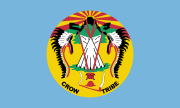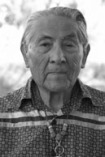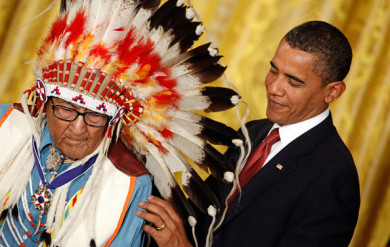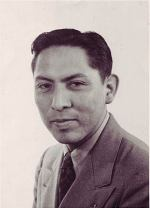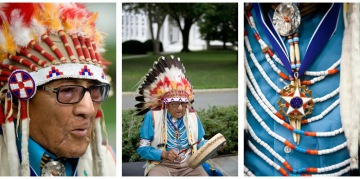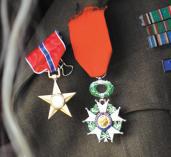Dr. Joseph Medicine Crow - High Bird; The Crow Nation
Crow Nation Official Website
Wikipedia
The Crow, called the Apsáalooke in their own Siouan
language, or variants including Absaroka, are Native Americans, who in
historical times lived in the Yellowstone River valley, which extends from present-day Wyoming, through Montana and into North Dakota, where it joins the
Missouri River. Today, they are enrolled in the federally recognized Crow Tribe of
Montana.
Pressured by the Ojibwe and Cree peoples (the Iron Confederacy), who had earlier and better access to guns through the fur trade, they had migrated there from the Ohio Eastern Woodland area to settle south of Lake Winnipeg, Canada. From there, they were
pushed to the west by the Cheyennes. Both the Crow and the Cheyennes were then pushed farther west by the Lakota (Sioux), who took over the territory from the Black
Hills of South Dakota to the Big Horn Mountains of Montana; the Cheyennes finally became close allies of the Sioux,
but the Crows remained bitter enemies of both Sioux and Cheyennes. The Crow were generally friendly with the whites and managed to retain a large reservation of over 9300 km2 despite territorial losses.
Since the 19th century, Crow people have been concentrated on their reservation established south of Billings, Montana. They also live in several major, mainly western, cities. Tribal headquarters are located at Crow Agency, Montana. Read more
- Crow Nation YouTube Channel
Joseph Medicine Crow died April 3, 2016 at age 102
CROW AGENCY www.kulr8.com
Flags will fly at half-staff today in Montana in honor of the memory of Dr. Joseph Medicine Crow, who passed away on April 3. He was 102 years old.
Dr. Medicine Crow was a WWII veteran and the last Crow War Chief. In 2009, he was awarded the Presidential Medal of Freedom – the highest civilian award in the United States.
In the 1930's, Medicine Crow became the first member of the Crow Tribe to obtain a master's degree.
One of the two new middle schools in School District Two is named after Medicine Crow and is expected to be finished sometime around mid-summer.
In Gov. Bullock's flag proclamation he states, "I join all Montanans in paying respect and celebrating the rich life of Joseph Medicine Crow. Joe was a Crow War Chief, veteran, elder, historian, author, and educator. His legacy will forever serve as an inspiration for all Native Americans - and all Montanans."
Joseph Medicine Crow - High Bird
Wikipedia
Joseph Medicine Crow-High Bird (born October 27, 1913) is a Crow historian and
author. He is also an enrolled member of the Crow Nation of Native Americans. His writings on Native American history and reservation culture are considered seminal
works, but he is best known for his writings and lectures concerning the Battle of the Little Bighorn. He is a
recipient of the Presidential Medal of Freedom, the Bronze Star Medal, and the Légion d'honneur. During World War II, he became the last war chief of the Crow Tribe, and is, as of 2013, the last living Plains Indian war chief. He is a
founding member of the Traditional Circle of Indian Elders & Youth. He turned 100 in October 2013.[1] Read more
Joseph Medicine Crow Died April 3, 2016. He was 102 years-old
He continued to write and lecture at universities and public institutions until his death at the age of 102 on April 3, 2016, while under hospice care in Billings, Montana.[19][21] He is survived by his only son Ron Medicine Crow, and daughters Vernelle Medicine Crow and Diane Reynolds, step-daughter Garnet Watan. He left numerous extended relatives as well.
President Obama Names Medal of Freedom Recipients (PDF)
THE WHITE HOUSE
Office of the Press Secretary
FOR IMMEDIATE RELEASE
July 30, 2009
16 Agents of Change to Receive Top Civilian Honor
Joe Medicine Crow – High Bird - at 24:27 in the video above
Dr. Joseph Medicine Crow, the last living Plains Indian war chief, is the author of seminal works in Native American history and culture. He is the last person
alive to have received direct oral testimony from a participant in the Battle of the Little Bighorn: his grandfather was a scout for General George Armstrong Custer. A veteran of World
War II, Medicine Crow accomplished during the war all of the four tasks required to become a "war chief," including stealing fifty Nazi SS horses from a German camp. Medicine Crow was the first
member of his tribe to attend college, receiving his master’s degree in anthropology in 1939, and continues to lecture at universities and notable institutions like the United Nations. His
contributions to the preservation of the culture and history of the First Americans are matched only by his importance as a role model to young Native Americans across the country. Read more
Dr. Joe Medicine Crow is the Crow Tribal Historian and the oldest living
man of the Crow tribe. In 1939, he was the first member of the Crow tribe to obtain a master’s degree. His Master’s thesis, "The Effects of European Culture Contact upon the Economic, Social, and
Religious Life of the Crow Indians", remains the most widely read source on Crow culture. He has received honorary doctoral degrees from the University of Southern California and Rocky Mountain
College.
Medicine Crow is the last traditional Plains war chief, having achieved the war deeds necessary to be declared a "chief" during World War II. He served in Europe, and
earned the Bronze Star, a US Forces individual military decoration for acts of bravery or merit, or for meritorious service. Medicine Crow was also honored for his service to France during World War
II when he received the National Order of the Legion of Honor from the French government on June 25, 2008. He was recognized for leading a war party that, under fire, retrieved dynamite to use to
attack German guns. He also overcame a German soldier in hand-to-hand combat on a street in France (sparing his life), and captured fifty SS horses at a farm where German officers were staying. Joe
Medicine Crow has also been nominated for the Congressional Gold Medal. Interviews with Dr. Medicince Crow were included in the 2007 Ken Burns PBS series "The War." In those interviews, he describes
some of his World War II experiences.
For his war deeds and "contributions to the preservation of the culture and history of the First Americans" and his "importance as a role model to young Native Americans
across the country," and other services to America, Joe Medicine Crow will receive the Presidential Medal of Freedom, America's highest civilian honor, on August 12, 2009.
Dr. Medicine Crow is a guest speaker at Little Bighorn College, the Custer Battlefield Museum, and several other colleges throughout the nation. Also an author, his books
include, A Handbook of Crow Indian Laws and Treaties, and From the Heart of the Crow Country. He lives on the Crow Reservation in Lodge Grass, Montana.
Last of the Crow war chiefs turns 101 in Montana
Aljazeera America
October 27, 2014 5:00AM ET
by Mary Hudetz @marymhudetz
Dr. Joseph Medicine Crow was trained in the old warrior traditions, which he took with him into WWII
CROW AGENCY, Mont. — The last Crow war chief entered the log-cabin trading post at the edge of the Little Bighorn Battlefield just after noon on a Sunday, supported by
his son on his left and a cane held firmly in his right hand.
Often, at tribal events such as powwows, he’ll swing his cane overhead in celebration. But on this October afternoon, with wind sweeping across the stretch of southern
Montana that’s home to the Crows, the cane simply supported the centenarian — Dr. Joseph Medicine Crow in English or High Bird, his traditional name, in Crow. more
"I was fortunate when I was growing up," he said, after a lunch of stew, frybread and pie at the trading post’s cafe. "The Crow Indians were still retaining the culture,
and they felt it was their duty to teach me to carry on the tribal heritage."
In turn, he’s made it his duty to document and share it.
On Monday, Medicine Crow — tribal historian, storyteller, decorated World War II veteran, first in his tribe to attain a master’s degree, last to achieve the status of
traditional Crow war chief and recipient of the Presidential Medal of Freedom — turns 101. As he described in a recent letter to a longtime friend and colleague, "On Oct. 27, I will have seen 101
snows."
And yet he still feels "young and strong." The eldest in a tribe of more than 10,000 members whose communities are scattered across nearly 3,600 square miles of plains
and mountains, he is perhaps as much beloved for his hold on history as he is for his humor. Read more
Joseph Medicine Crow (October 27, 1913 – April 3, 2016)
Senator Enzi on the passing of Joe Medicine Crow
Michael B. Enzi was sworn in as Wyoming's 20th United States Senator on January 7, 1997.
Enzi has made a name on Capitol Hill for his unique way of breaking down party lines and working across the aisle. His way of working across party lines is gaining momentum around the nation’s capital. Since 2005, under his 80 percent rule he has had 39 bills go through the Health, Education, Labor and Pensions Committee and be signed into law by the President. The average committee gets 3 bills passed every 2 years. Enzi believes that people can agree on 80 percent of the issues 80 percent of the time and if they leave the other 20 percent out they can get a lot done. With that mentality he has turned one of the most contentious Senate committees into one of the most productive. Read more


